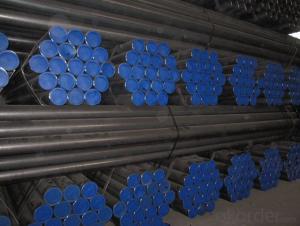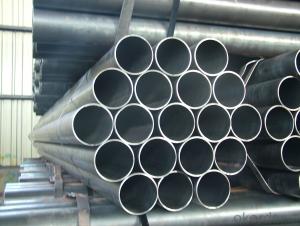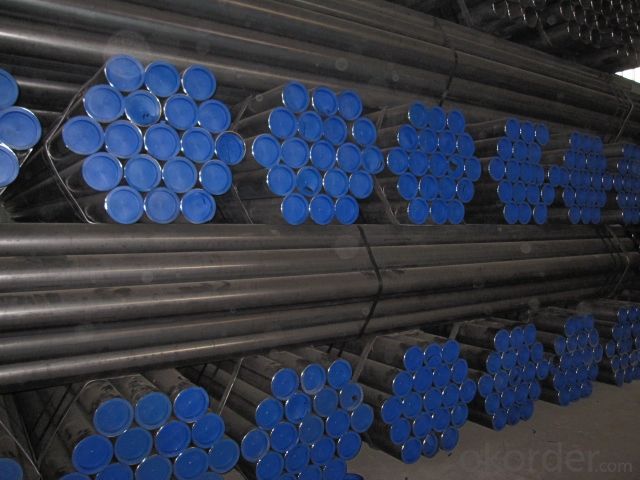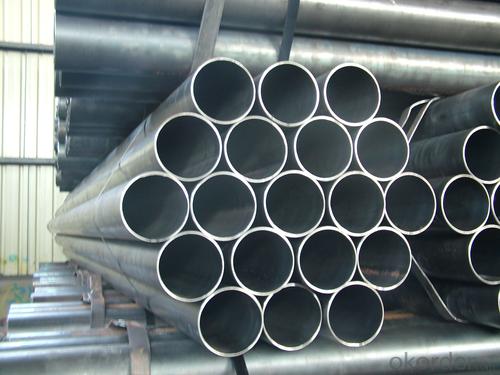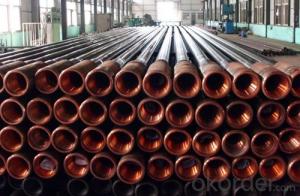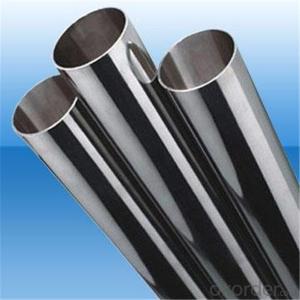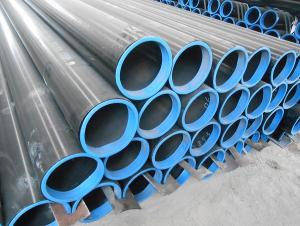Best roller pipe for mining industry
- Loading Port:
- China Main Port
- Payment Terms:
- TT OR LC
- Min Order Qty:
- -
- Supply Capability:
- -
OKorder Service Pledge
OKorder Financial Service
You Might Also Like
Outside diameter | 1/2”-12” |
Wall Thickness | 1.0 -12mm SCH40,60,80, etc. |
Tolerance | ±5% |
Material | Q195,Q215,Q235,Q345 |
Quality grade | First grade |
Section Shape | Round |
Surface Treatment | Hot rolled and ERW |
Technique | Hot rolled |
Ends | Threaded Ends, Grooved Ends |
Length | Less than 12m |
MOQ | 10 Metric Ton or as your request if normal size |
Deliver Time | Stock |
Package | Nude pipe in bundle or as your request |
Payment terms | T/T,L/C |
Standard | GB/T3091-2008; BS1837-1985; ASTM A53/A53M-07; ASTM A513-07; ASTM A252; JIS G3444-06; JIS G3452-2010; EN10255; DIN2440 |
Main Usage Relevant Size | 1. Water Pipe Material: Q195/Q215/Q235/Q345B Outside Diameter: 60-273mm 2. Threaded/Screwed Pipe Material: Q195/Q215/Q235/Q345B Outside Diameter: 21.3-165.1mm 3. Structural Steel Pipe Material: Q195/Q215/Q235/Q345B Outside Diameter: 21.7-190.7mm 4. Scaffolding Pipe Material: Q195/Q215/Q235/Q345B Outside Diameter: 48mm 5. Straight Seam Welded Pipe Material: Q195/Q215/Q235/Q345B Outside Diameter: 48-273mm 6. Steel pipes with a longitudinal ERW Material: Q195/Q215/Q235/Q345B Outside Diameter: 21.3-273.1mm Standard: GB/T 3091-2008 |
- Q: What is the pressure rating of steel pipes?
- The pressure rating of steel pipes varies depending on the specific grade and size of the pipe. However, steel pipes are known for their high strength and durability, allowing them to withstand high-pressure applications.
- Q: Can steel pipes be used for underground pressure pipelines?
- Underground pressure pipelines can indeed utilize steel pipes. Renowned for their robustness and endurance, steel pipes are well-suited for diverse applications, including underground pressure pipelines. They possess the capability to withstand high pressure and exhibit resistance to corrosion, rendering them a dependable choice for subterranean transportation of fluids or gases. Moreover, steel pipes offer versatility in terms of size and thickness, enabling customization to meet the specific requirements of any pipeline undertaking. Nevertheless, it is crucial to ensure adequate coating or lining of the steel pipes to avert corrosion resulting from soil conditions or the conveyed substance. Regular maintenance and inspections are also imperative to guarantee the integrity and longevity of underground pressure pipelines constructed with steel pipes.
- Q: What are the different coating options for steel pipes?
- There are several coating options available for steel pipes, each serving a specific purpose and providing unique benefits. Some of the most common coating options for steel pipes include: 1. Fusion Bonded Epoxy (FBE) Coating: FBE coating is a popular choice for steel pipes used in various industries. It provides excellent corrosion resistance, impact resistance, and adhesion to the pipe surface. FBE coating is typically applied through a heat-induced chemical reaction, creating a durable and protective layer. 2. Polyethylene (PE) Coating: PE coating is commonly used for underground steel pipes, as it provides superior resistance against corrosion, abrasion, and chemicals. This coating is applied using extrusion methods and forms a seamless layer over the steel pipe, preventing any moisture penetration. 3. Polyurethane (PU) Coating: PU coating is known for its exceptional resistance to abrasion, chemicals, and harsh environmental conditions. It is commonly used for steel pipes exposed to extreme temperatures or in aggressive environments. PU coating can be applied in multiple layers to provide enhanced protection. 4. Coal Tar Enamel (CTE) Coating: CTE coating is a traditional option for steel pipes that require protection against corrosion. It is a thick, black coating that provides excellent resistance to water, soil, and atmospheric corrosion. CTE coating is typically applied using a hot-applied coating method. 5. Zinc Coating: Zinc coating, also known as galvanization, is a widely used protective coating for steel pipes. It involves applying a layer of zinc to the pipe surface, creating a barrier against corrosion. Zinc coating can be applied through hot-dip galvanization or electro-galvanization methods. 6. Concrete Coating: Concrete coating is often used for steel pipes in underground or submerged applications. It provides a robust protective layer against corrosion, abrasion, and mechanical damage. Concrete coating is typically applied as a cement mortar or a reinforced concrete layer. These are just some of the coating options available for steel pipes. The choice of coating will depend on factors such as the intended application, environmental conditions, and required durability. It is essential to select the appropriate coating to ensure the longevity and performance of the steel pipes in various industries.
- Q: What are the different types of gaskets used with steel pipes?
- There are several types of gaskets commonly used with steel pipes, including spiral wound, ring joint, and flat gaskets. Spiral wound gaskets are made by winding a metal strip and a filler material together, providing excellent sealing properties. Ring joint gaskets are typically used in high-pressure applications and have a metallic ring shape to ensure a tight seal. Flat gaskets, on the other hand, are simple, flat pieces of material, often made from rubber or graphite, and are used for low-pressure applications.
- Q: Are steel pipes suitable for fire protection systems?
- Yes, steel pipes are suitable for fire protection systems. They are widely used due to their durability, strength, and resistance to high temperatures. Steel pipes can efficiently transport water or fire suppressants to extinguish fires effectively, making them a reliable choice for fire protection installations in various buildings and industrial settings.
- Q: How long do steel pipes last?
- The lifespan of steel pipes can vary depending on several factors, including the quality of the steel used, the environment in which they are installed, and the maintenance and care given to them. Generally, steel pipes are known for their durability and longevity. With proper installation and regular maintenance, steel pipes can last for several decades, often exceeding 50 years. However, it is important to note that external factors such as corrosion, exposure to extreme temperatures, and chemical reactions can significantly affect their lifespan. Regular inspections, timely repairs, and protective coatings can help extend the life of steel pipes, ensuring their reliability and functionality for many years.
- Q: How are steel pipes used in plumbing systems?
- Steel pipes are commonly used in plumbing systems for their durability and strength. They are used to transport water, gas, and waste materials in both residential and commercial buildings. Steel pipes are known for their resistance to corrosion and high pressure, making them ideal for underground and outdoor applications. Additionally, steel pipes are often used for plumbing fixtures such as faucets, showers, and toilets, providing a reliable and long-lasting solution for water distribution and drainage.
- Q: What are the common methods for cleaning the inner surface of steel pipes?
- Cleaning the inner surface of steel pipes can be done using different methods. Some commonly used methods include: 1. Mechanical Cleaning: Debris, rust, or scale on the inner surface of the steel pipe can be physically removed using mechanical tools like wire brushes, scrapers, or abrasive pads. This method is effective for removing loose or loosely adhered contaminants. 2. Chemical Cleaning: Stubborn deposits, rust, or scale can be dissolved or loosened using acidic or alkaline solutions. These solutions are circulated through the pipe for a specific period, allowing the chemical to react and break down the contaminants. Chemical cleaning is used when mechanical cleaning is not enough. 3. High-Pressure Water Jetting: High-pressure water is directed through a nozzle into the steel pipe to remove debris, rust, or scale from the inner surface. The force of the water jet dislodges and flushes out the contaminants. This method is efficient for cleaning pipes with complex geometries or hard-to-reach areas. 4. Shot Blasting: High-speed abrasive particles are propelled against the inner surface of the steel pipe to remove rust, scale, or other contaminants. Shot blasting is commonly used for larger pipes or pipes with heavy deposits. It provides a thorough and uniform cleaning by removing the surface layer of the steel along with the contaminants. 5. Ultrasonic Cleaning: High-frequency sound waves are used to create microscopic bubbles in a cleaning solution. These bubbles implode upon contact with the inner surface of the steel pipe, effectively loosening and removing contaminants. Ultrasonic cleaning is particularly effective for cleaning small-diameter pipes or pipes with intricate details. It's important to consider factors such as the type and extent of contamination, pipe size and geometry, and desired level of cleanliness when choosing a cleaning method. Safety measures should always be taken to protect workers and maintain the integrity of the steel pipes.
- Q: What is the maximum length of a steel pipe?
- The maximum length of a steel pipe will vary depending on various factors such as manufacturing capabilities, transportation limitations, and practical considerations. However, in general, steel pipes can typically be manufactured and transported in lengths ranging from a few meters to several hundred meters.
- Q: What are the applications of stainless steel pipes?
- Stainless steel pipes are widely used in various industries and applications due to their excellent corrosion resistance, durability, and strength. Some common applications include plumbing systems, water supply and distribution, heating and cooling systems, oil and gas industry, chemical processing plants, food and beverage industry, automotive industry, construction, and infrastructure projects. Additionally, stainless steel pipes are also utilized in pharmaceutical manufacturing, aerospace engineering, marine applications, and wastewater treatment facilities.
Send your message to us
Best roller pipe for mining industry
- Loading Port:
- China Main Port
- Payment Terms:
- TT OR LC
- Min Order Qty:
- -
- Supply Capability:
- -
OKorder Service Pledge
OKorder Financial Service
Similar products
Hot products
Hot Searches
Related keywords
